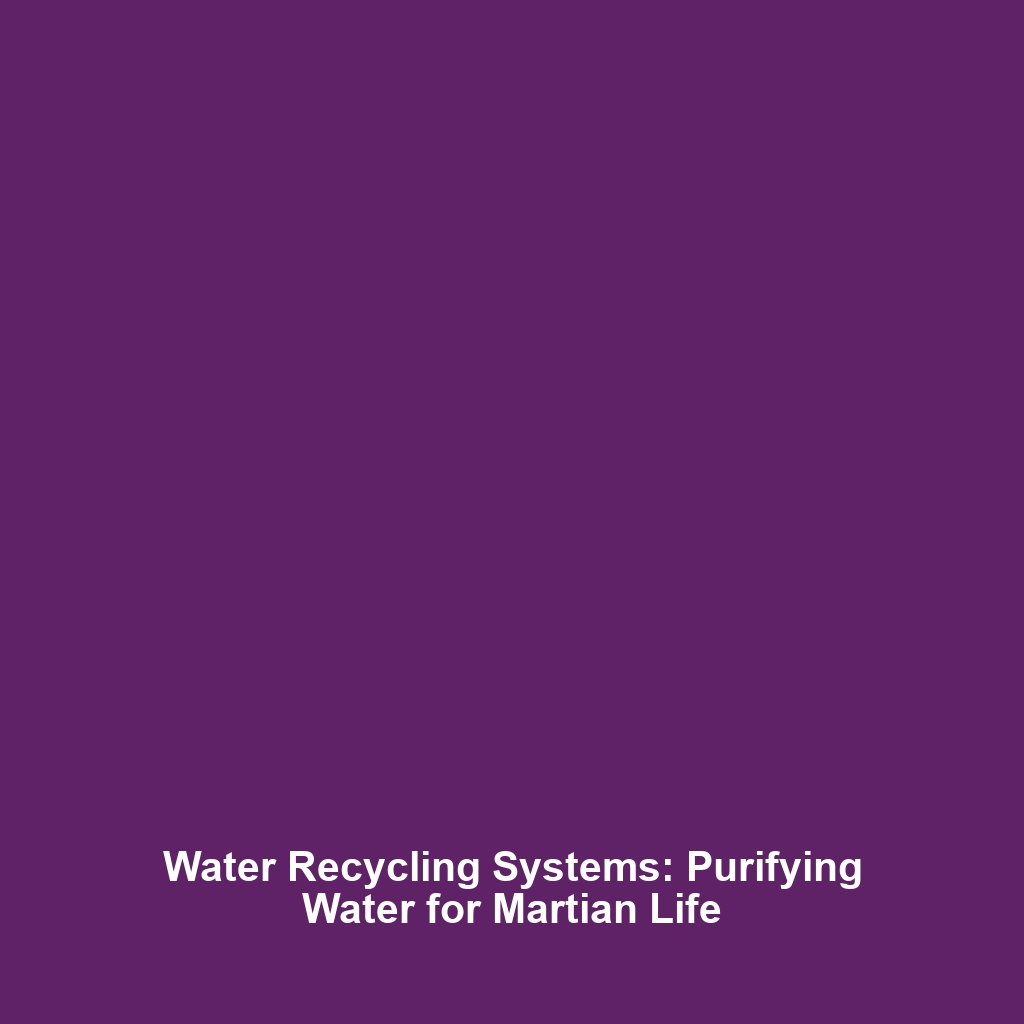Water Recycling Systems: Purifying Water for Human Consumption on Mars
Water recycling systems are critical infrastructure for colonizing Mars, ensuring the availability of clean water for human consumption. This necessity arises from the harsh and arid Martian environment, where access to liquid water is severely limited. Efficient and effective recycling methods will not only support human life on Mars but also serve as a model for sustainable practices that can be replicated in other extraterrestrial environments. Understanding the technology and systems behind water recycling is pivotal for future missions to the Red Planet.
Key Concepts of Water Recycling Systems
Water recycling systems encompass a variety of technologies designed to purify and reclaim water from diverse sources, including waste water and atmospheric moisture. These systems comprise several key components:
- Filtration: Removes contaminants from water through physical, chemical, or biological processes.
- Membrane Technologies: Utilizes semi-permeable membranes to separate contaminants from water, ensuring high-quality output.
- Disinfection: Employs methods such as UV light and chemical agents to eliminate pathogens and ensure safe drinking water.
- Condensation Recovery: Captures water from humid air, a vital source in Martian colonies where surface water is scarce.
Integration into Mars Colonization
Integrating these technologies is essential for establishing self-sustaining habitats on Mars, thereby reducing reliance on Earth-based supplies. With advancements in recycling systems, water reclamation becomes not only feasible but also indispensable for long-term colonization efforts.
Applications and Real-World Uses
Water recycling systems have several significant applications, particularly in the context of colonizing Mars. Key uses include:
- Closed-loop Life Support Systems: In habitats, these systems will recycle water from human activities, including sanitation and food preparation, to meet essential needs.
- Agricultural Irrigation: Purified water will support hydroponic and aeroponic farming systems that are vital for food production on Mars.
- Research Facilities: Reliable water sources will support scientific research, enabling experiments that require water for various testing procedures.
Current Challenges
Despite the promising technologies available, challenges exist in implementing water recycling systems effectively for Mars colonization:
- Resource Constraints: Developing systems that are energy-efficient and robust enough to withstand Martian conditions is a significant hurdle.
- System Failures: Potential failures in recycling systems could lead to critical water shortages, requiring redundancy and backup systems.
- Public Acceptance: Ensuring that future colonists are comfortable with consuming recycled water poses psychological challenges.
Future Research and Innovations
The future of water recycling systems in the context of colonizing Mars looks promising due to several ongoing innovations, including:
- Advanced Filtration Technologies: Developing nano-filter materials that can effectively remove even the smallest contaminants.
- Bioreactor Systems: Innovative use of microbial systems that can break down waste and recover clean water efficiently.
- Smart Monitoring Systems: Utilizing AI to monitor and manage water quality and system performance in real-time.
Conclusion
Water recycling systems are a cornerstone of sustainable colonization efforts on Mars, ensuring a reliable supply of water necessary for human survival and growth. As research and technologies advance, the potential for these systems to facilitate life on Mars will only increase. For those interested in the future of space exploration, exploring water recycling technologies is essential. For further reading, check out our articles on sustainability in space and technologies for Mars colonization.

Leave a Reply